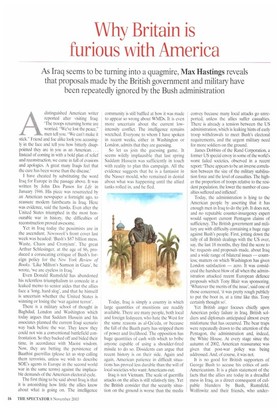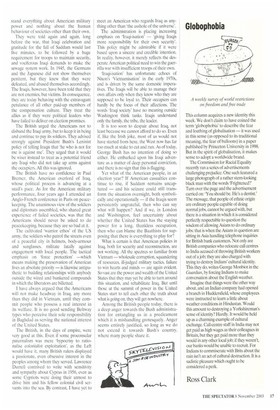Why Britain is furious with America
As Iraq seems to be turning into a quagmire, Max Hastings reveals that proposals made by the British government and military have been repeatedly ignored by the Bush administration Adistinguished American writer reported after visiting Iraq: 'The troops returning home are wonied. "We've lost the peace," men tell you. "We can't make it stick." Friend and foe alike look you accusingly in the face and tell you how bitterly disappointed they are in you as an American. . . . Instead of coming in with a bold plan of relief and reconstruction, we came in full of evasions and apologies. A great many Iraqis feel that the cure has been worse than the disease.'
I have cheated by substituting the word Iraq for Europe in the passage above. It was written by John Dos Passos for Ltfe in January 1946. His piece was resurrected by an American newspaper a fortnight ago, to reassure modern fainthearts in Iraq. Here was evidence, said the hawks. Even after the United States triumphed in the most honourable war in history, the difficulties of reconstruction proved awesome.
Yet in Iraq today the pessimists are in the ascendant. Newsweek's front cover last week was headed: `Bush's $87 billion mess. Waste. Chaos and Cronyism'. The great Arthur Schlesinger, at the age of 86, produced a coruscating critique of Bush's foreign policy for the New York Review of Books. 'Like Milton's Samson in Gaza', he wrote, 'we are eyeless in Iraq.'
Even Donald Rumsfeld has abandoned his relentless triumphalism to concede in a leaked memo to senior aides that the allies face a 'long, hard slog', and that he himself is uncertain whether the United States is winning or losing the 'war against terror'.
There is a military school of thought in Baghdad, London and Washington which today argues that Saddam Hussein and his associates planned the current Iraqi scenario way back before the war. They knew they could not win a conventional battlefield confrontation. So they backed off and bided their time, in accordance with Maoist wisdom. Now, they are betting the persistence of Baathist guerrillas (please let us stop calling them terrorists, unless we wish to describe SOE's agents in Europe in the second world war in the same terms) against the implacable demands of the American electoral cycle.
The first thing to be said about Iraq is that it is astonishing how little the allies know about what is going on. The intelligence community is still baffled at how it was made to appear so wrong about WMDs. It is even more uncertain about the current lowintensity conflict. The intelligence remains wretched. Everyone to whom I have spoken in recent weeks, either in Washington or London, admits that they are guessing.
So let us join the guessing game. It seems wildly implausible that last spring Saddam Hussein was sufficiently in touch with reality to plan this campaign. All the evidence suggests that he is a fantasist in the Nasser mould, who remained in denial about what was happening until the allied tanks rolled in, and he fled.
Today, Iraq is simply a country in which large quantities of munitions are readily available. There are many people, both local and foreign fedayeen. who hate the West for the same reasons as al-Qa'eda, or because the fall of the Baath party has stripped them of power and livelihood. The opposition has huge quantities of cash with which to bribe anyone capable of using a shoulder-fired missile to do so. Dissidents can argue that recent history is on their side. Again and again, American patience in difficult situations has proved less durable than the will of local societies who want Americans out.
Iraq is not Vietnam. The scale of guerrilla attacks on the allies is still relatively tiny. Yet the British consider that the security situation on the ground is worse than the media
convey because many local attacks go unreported, unless the allies suffer casualties. There is already a tension between the US administration, which is leaking hints of early troop withdrawals to meet Bush's electoral requirements, and the urgent military need for more soldiers on the ground.
James Dobbins of the Rand Corporation, a former US special envoy in some of the world's worst failed societies, observed in a recent report: 'There appears to be an inverse correlation between the size of the military stabilisation force and the level of casualties. The higher the proportion of troops relative to the resident population, the lower the number of casualties suffered and inflicted'.
Today, the administration is lying to the American people by asserting that it has enough men in Iraq to do the job. It does not, and no reputable counter-insurgency expert would support current Pentagon claims of sufficiency. The British government and military are with difficulty containing a huge rage against Bush's people. First, jotting down the tally of all British dealings with the US over, say, the last 18 months, they find the score to be: requests and proposals made, about Iraq and a wide range of bilateral issues — countless; matters on which Washington has given London satisfaction — zero. It was considered the harshest blow of all when the administration attacked recent European defence proposals which Tony Blair was sponsoring. 'Whatever the merits of the issue', said one of those concerned, it was pretty rough publicly to put the boot in, at a time like this. Tony certainly thought so'.
Yet British anger focuses chiefly upon American policy failure in Iraq. British soldiers and diplomats anticipated almost every misfortune that has occurred. The bear traps were repeatedly drawn to the attention of the Pentagon, the administration and, indeed, the White House. At every stage since the autumn of 2002, American reassurance was given that post-war policy was being addressed. And, of course, it was not.
It is no good for British supporters of George Bush to accuse his critics of antiAmericanism. It is a plain statement of the facts that the allies are today in a dreadful mess in Iraq, as a direct consequent of culpable blunders by Bush, Rumsfeld, Wolfowitz and their friends, who under stand everything about American military power and nothing about the human behaviour of societies other than their own.
They were told again and again, long before the war, that Iraqi celebration and gratitude for the fall of Saddam would last five minutes, to be followed by a huge requirement for troops to maintain security, and vociferous Iraqi demands to make the sewage system work. In 1945, the Germans and the Japanese did not show themselves penitent, but they knew that they were defeated, and abased themselves accordingly. The Iraqis, however, have been told that they are not enemies, but victims. In consequence, they are today behaving with the extravagant petulance of all other paid-up members of the compensation culture. They treat the allies as if they were political leaders who have failed to deliver on election promises.
The British urged the Americans not to disband the Iraqi army, but to keep it in being and continue to pay its soldiers. They advised strongly against President Bush's Leninist policy of telling Iraqis that 'he who is not for me is against me'. They urged that it would he wiser instead to treat as a potential friend any Iraqi who did not take up arms against the occupiers. All this was ignored.
The British have no confidence in Paul Bremer, the American overlord of Iraq, whose political process is advancing at a snail's pace. As for the American military performance, four years ago I attended an Anglo-French conference in Paris on peacekeeping. The unanimous view of the soldiers and diplomats assembled, who shared great experience of failed societies, was that the Americans should never be asked to do peacekeeping, because they are so bad at it.
The cultivated 'warrior ethos' of the US army, the soldiers who patrol the streets even of a peaceful City in helmets, body-armour and sunglasses, militate fatally against engagement with local people. The tactical emphasis on 'force protection' —which means making the preservation of American lives an absolute priority — is likewise antipathetic to building relationships with anybody outside the wired and bunkered compounds in which the liberators are billetted.
I have always argued that the Americans will not make headway in Iraq, any more than they did in Vietnam, until they commit people who possess a real interest in its welfare. It is no good sending Beltway types who perceive their sole responsibility in Baghdad as serving the national interest of the United States.
The British, in the days of empire, were very good at this. Even if some proconsular paternalism was mere 'hypocrisy to rationalise colonialist exploitation', as the Left would have it, many British rulers displayed a passionate, even obsessive interest in the peoples among whom they served. Lawrence Durrell contrived to write with sensitivity and sympathy about Cyprus in 1956, even as some Cypriots were doing their utmost to drive him and his fellow colonial civil servants into the sea. By contrast, I have yet to meet an American who regards Iraq as anything other than 'the asshole of the universe'.
The administration is placing increasing emphasis on 'Iraqi-isation' — 'giving Iraqis more responsibility for their own security'. This policy might be admirable if it were based upon a sincere and credible intention. In reality, however, it merely reflects the desperate American political need to win the guerrilla war with insufficient troops of their own.
'Iraqi-isation' has unfortunate echoes of Nixon's 'Vietnarnisation' in the early 1970s, and is driven by the same domestic imperatives. The Iraqis will be able to manage their own affairs only when they know who they are supposed to be loyal to. Their occupiers can hardly be the focus of their affections. The words 'Iraqi society' have no meaning outside Washington think tanks. Iraqis understand only the family, the tribe, the leader.
It is too soon to despair about Iraq, not least because we cannot afford to do so. Even if, like the Irish joke, most of us would not have started from here, the West now has far too much at stake to cut and run. As of today, George Bush has no intention of doing so either. He embarked upon his Iraqi adventure as a matter of deep personal conviction, and there is no sign that this is flagging.
Yet what of the American people, in an election year? If American casualties continue to rise, if Saddam remains uncaptured — and his seizure could still transform the situation overnight, both symbolically and operationally — if the Iraqis seem persistently ungrateful, then who can say what will happen? And if we, in London and Washington, feel uncertainty about whether the United States has the staying power for a long, thankless occupation, then who can blame the Baathists for supposing that there is everything to play for?
What is certain is that American policies in Iraq, both for security and reconstruction, are not working. All the spectres so familiar from Vietnam — wholesale corruption, squandering of resources, ill-judged military tactics, failure to win hearts and minds — are again evident. So vast are the power and wealth of the United States that they may yet be able to turn around this situation, and rehabilitate Iraq. But until those at the summit of power in the United States start to tell each other the truth about what is going on, they will get nowhere.
Among the British people today, there is a deep anger towards the Bush administration for entangling us in a predicament which it is mishandling grotesquely. Anger seems entirely justified, so long as we do not extend it towards Bush's country, where many people share it.



































































































 Previous page
Previous page